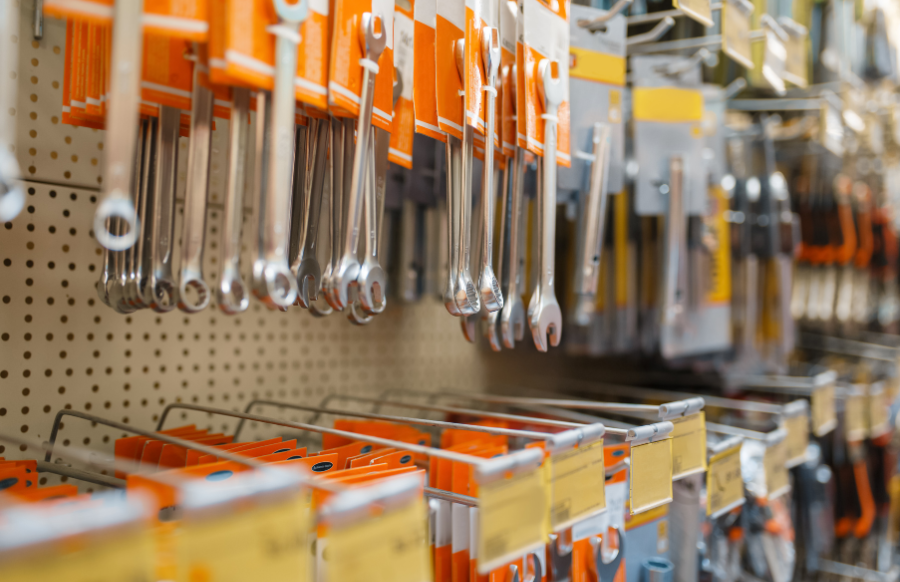Key Takeaways:
- The hardware business in the Philippines is a viable venture due to the consistent demand for hardware items.
- Market research, careful decision-making between franchising and starting from scratch, and creating a thorough business plan are essential initial steps.
- Crucial operational aspects such as location selection, logistics, the POS system, hiring professionals, and developing a unique selling proposition play vital roles in the success of the hardware business.
- Implementing an effective marketing strategy, focusing on customer retention, and having consistent communication help build a solid brand and ensure customer loyalty.
Do you find yourself captivated by the entrepreneurial spirit? Are you exploring the possibilities of how to start a hardware business in the Philippines?
Embarking on a hardware business journey may be your gateway to success. While steering through this industry may present challenges, it can yield bountiful rewards with the proper guidance.
This article delivers a comprehensive, step-by-step guide to help you establish your very own hardware business.
Are you ready to lay the groundwork for your future?
Let’s dive in and unravel the steps to transform your entrepreneurial dream into reality. Please stick with us; this journey could be the most rewarding decision you’ve ever made!
Why Choose the Hardware Business?

The decision to enter the hardware industry may have been made for several reasons, with profitability being a significant factor. It isn’t easy to give a clear answer because several factors affect how profitable a hardware company is in the Philippines.
Nevertheless, the industry has a generally promising future. The Business Research Company estimates that from 2022 to 2023, the global hardware market grew at a compound annual growth rate of 8.9%. Additionally, the market is anticipated to grow at a CAGR of 7.9% to reach US$164.21 billion in 2027.
Whether in a remote province or the center of Manila, there is always a need for hardware products like tools, building materials, and home improvement items.
Even in a time when digital technology predominates, hardware materials are essential and irreplaceable for everything from minor household repairs to large-scale construction projects.
Given the industry’s resilience, investing in a hardware company could lead to a reliable income stream. And isn’t it rewarding to sell goods that help communities grow? It’s a company that has a noticeable impact.
Additionally, hardware materials are durable and have a longer shelf life, eliminating concerns about expiration dates or product damage. This ensures that inventory remains viable and waste is minimized.
How much does it cost to start a hardware business?
Starting a new business is exciting, but you may wonder, “how to start a hardware business and how much does it cost?” While this depends significantly on your company’s size, location, and particulars, here is a general estimate.
Starting a hardware store requires significant capital, even for the most basic setup. You’ll need at least P300,000 to start, and it may take some time to generate enough revenue to cover your expenses. This budget accounts for inventory, rent, permits, and the initial store opening costs.
Remember that this is only an estimate and that prices may differ. A thorough financial analysis before starting a hardware business is always a good idea. Making wise investments can mean the difference between success and hardship.
How to Start a Hardware Business: A Step-by-Step Checklist

Although there isn’t a secret recipe for launching a small business, following some general guidelines can increase your chances of success. The following is a step-by-step guide for opening a hardware store in the Philippines:
Research the hardware business market
If you plan to start a hardware business, you need to understand the market and the construction industry. This phase is all about gathering information.
Market research is an essential first step in providing valuable insights, helping you make informed decisions about your hardware store. Remember, knowledge is power, especially when it comes to business!
Here are some questions to consider when conducting your market research effectively:
- Who are your potential customers within the hardware industry in the Philippines? What is their demographic profile, and what are their needs and preferences?
- Who are your direct competitors in the local market? What are their strengths and weaknesses? How can you differentiate your hardware store from them?
- What are the latest trends in the hardware industry, both globally and locally? How can you capitalize on these trends in your own business?
- What is the current economic climate, and how is it affecting the hardware industry? Are people investing in home improvements or construction?
- Are there any potential partnerships or alliances in the local market that can enhance your business?
- How does the location influence the market? Does the local community have specific needs based on their lifestyle or the area’s infrastructure?
- How could potential socio-economic, political, technological, or environmental changes affect the hardware industry in the future?
Detailed market research is more than just an initial step; it’s an ongoing process that keeps your business aligned with customer needs and industry trends. Your market research should evolve as your business grows, helping your hardware store thrive in a changing environment.
Decide on Franchising or Starting a hardware store from scratch
Once you fully grasp the hardware and construction market, you must choose whether to open your hardware store from scratch or join a franchise. Each route has advantages and disadvantages.
Starting from scratch gives you complete control over every aspect of your company, from the name of the brand to the minor operational components. You can impose your vision on every facet of the store.
The advantages of franchising, on the other hand, include a ready-made business model and immediate brand recognition, which can help lure customers. The franchise’s regulations must be followed, and you might have to make recurring payments.
Your decision is yours. Consider your personal goals, financial resources, and risk tolerance as you carefully weigh your options.
Create a Hardware Store Business Plan

Knowing how to start a hardware business in the Philippines means knowing how to draft a solid business plan.
Creating a business plan for your hardware store is not just a bureaucratic hoop to jump through. It’s your roadmap, guiding you from the initial stages of setting up your business to growth and beyond. Here’s what your business plan should include:
- An Executive Summary: This overviews your business idea, mission, and your hardware store’s unique selling points. Although it comes first, write it last after completing the other sections.
- A Description of Your Business: Here, provide detailed information about your business, including the legal structure (sole proprietorship, partnership, corporation), the nature of the company, and your long-term business goals.
- Your Target Market: Who are your customers? Define your target demographic, their needs, and how your store will meet them. Remember, no business can cater to everyone. Focus on the market that your products and services are best suited for.
- Your Products and Services: List the products and services your hardware store will offer. This could range from hardware supplies to services like home delivery or installation.
- Your Marketing Plan: How will you attract and retain customers? Detail your promotional strategies, pricing policy, sales strategy, and distribution methods.
- Your Financial Projections: This section should include a sales forecast, expenses budget, cash flow statement, and break-even analysis. If you’re seeking financial aid, lenders or investors will want to see this section.
- Detailed Plans for Possible Future Expansion: If you plan on scaling your business in the future, outlining potential growth strategies can demonstrate foresight and ambition.
Remember, your business plan isn’t a static document. As your business grows and market conditions change, your plan should adapt to reflect these changes. It’s a living guide that keeps your business on track and aligns your team toward common goals.
Raise Sufficient Capital

Raising sufficient capital is needed to start a hardware store. It’s not just about the initial investment but also the operational expenses until your business becomes profitable. Here’s where you need to get creative and resourceful.
- Self-funding. This is an option if you have sufficient savings. However, don’t drain all your savings. It’s essential to have a financial buffer for personal expenses.
- Seek external investors. You can pitch your business plan to potential investors who may be interested in your venture and can provide the necessary capital. However, be mindful of scams. If it’s too good to be true, it probably is.
- Consider bank loans as well. Many banks offer business loans with varying interest rates and payment terms. Be sure to shop around for the best times. Some banks even have special loan programs for small businesses.
- Don’t overlook government loan programs. The Department of Trade and Industry (DTI) offers a micro, small, and medium enterprises (MSME) loan program in the Philippines. Similarly, the Small Business Corporation (SBC), a government financial institution, provides microfinance for small businesses.
- Crowdfunding platforms can also be a source of capital. Here, multiple people contribute small amounts towards your capital.
Raising capital is a critical step in starting your hardware store. Remember, it’s not just about securing funds but also managing them effectively to ensure the sustainability and growth of your business.
Open a business bank account & credit card

Learning how to start a hardware business in the Philippines can be challenging but rewarding. However, one of its main challenges is separating your personal and business finances.
It’s wise to open a business bank account and credit card as they simplify tracking revenue and expenses and present your hardware store in a professional light to suppliers and customers.
Most banks in the Philippines provide various business accounts that can be customized to your requirements. Some offer extra advantages like business credit cards or access to loans for small businesses.
You can protect your assets from business liabilities and make tax time much easier by keeping your personal and business finances separate. Although it’s a small step, it’s essential for the financial stability of your company.
Find a Suitable Location

In the hardware business, location can make or break your success. Your store should be easily accessible to your target customers and ideally located with significant foot or vehicle traffic. If your customers are mainly construction businesses, consider being near commercial areas. Being in or near residential areas might be more beneficial if homeowners are your target.
Moreover, check the proximity of your competitors. While being close may allow you to tap into their customer flow, being too close may result in fierce competition.
Finding a suitable location might take time, but it’s worth the effort. The right location can significantly boost your hardware store’s visibility and customer accessibility, leading to better business prospects.
Apply for Hardware Store Business Licenses and Permits

Making your business official is the next step. You must register your hardware company in the Philippines with the Securities and Exchange Commission (SEC) for partnerships and corporations or the Department of Trade and Industry (DTI) for sole proprietorships.
Next, apply for a Barangay Clearance from your local barangay office. Then, go to the city or municipal building to obtain a mayor’s or business permit.
Remember to obtain your company’s Tax Identification Number from the Bureau of Internal Revenue (BIR), as you’ll need it for transactions involving taxes.
Additionally, ensure your hardware store has the necessary licenses, such as the Bureau of Fire Protection’s Fire Safety and Inspection Certificate.
This step can take a while with all the paperwork, but it’s essential. By registering your company and obtaining the required licenses, you can ensure that everything is in order and that business operations are legal.
Build Your Product List and Find Suppliers

Now, let’s fill up your store! Building your product list should be guided by the needs of your target market. Your product range should be wide enough to serve their needs yet be specific enough not to overwhelm your inventory.
Are you in an area with a lot of building construction? Maybe you should prioritize stocks on lumber, hollow blocks, and sand.
Are you in a residential area? Maybe you should stock up on general tools for DIY-ers like power tools and home improvement materials.
When choosing suppliers, prioritize quality, reliability, and pricing. Ensure they provide high-quality products that your customers can rely on. Establish relationships with multiple suppliers to prevent possible supply chain disruptions. Remember, timely delivery of quality products is crucial for customer satisfaction.
Whether nails, paint, plumbing materials, or power tools, each item in your hardware store builds customer trust. Choose wisely and ensure a steady supply.
Establish Inbound and Outbound Logistics
With your product list ready and suppliers lined up, it’s time to iron out your logistics. Inbound logistics include transporting, storing, and delivering goods from your suppliers to your store. You must coordinate delivery schedules, quantities, and handling procedures with your suppliers.
On the other hand, outbound logistics refers to delivering goods from your store to the customer. Will you offer home delivery? If so, you need to plan for transportation, handling, and possibly, installation services.
Logistics might not be the most glamorous part of your business, but it’s the backbone. Efficient logistics mean your products get where they need to be when they need to be, ensuring satisfied customers and smooth operations.
Invest in a Reliable POS System
Now that your store has products let’s talk about sales. While most of local hardware stores manually tally their sales, a hardware store may benefit from a reliable Point of Sale (POS) system. A POS system does more than process transactions; it tracks inventory, monitors sales, and manages customer data.
With a POS system, you can stay on top of which items are selling fast and which are not. It can even help with re-ordering items when stocks run low. A reliable POS system makes your hardware store more efficient, helping you provide better customer service.
A modern POS system can give your hardware business a competitive edge in this digital age. And while it’s a little more expensive than manual tallying, consider it an investment that pays for itself with the value it provides.
Hire Professionals and Seek Expert Advice
You’ve done much on your own up to this point, but remember, no one succeeds alone. As your hardware business takes shape, consider bringing in professionals and experts who can guide and help your business thrive. This might include accountants, legal advisors, and business consultants.
You may also need to hire staff for your store. Look for people who are not only competent but also share your commitment to excellent customer service. After all, your team is a reflection of your store.
Getting expert advice can help you avoid common pitfalls and set your hardware store up for success. Similarly, having a dedicated and competent team ensures your operations run smoothly and customers are happy, which is the ultimate goal.
Start Marketing Your Business & Build Awareness
You’ve established your hardware store, now it’s time to inform the world about your business. Start implementing your marketing strategy to build awareness and attract customers.
Whether through traditional and online advertising, social media campaigns, or local community events, ensure your marketing efforts consistently communicate your unique selling points. This consistent communication builds your brand’s image in the minds of customers.
Remember, building awareness is an ongoing process. Even when your hardware store becomes well-known, continuous marketing efforts help maintain your store’s reputation and attract new customers. As your business grows, consider reinvesting some of your profits into marketing to reach an even wider audience. The sky’s the limit!
Develop Your Competitive Edge, Increase Profitability, and Keep Customers Coming Back

As your hardware store attracts customers, your next challenge is setting your business apart from competitors and ensuring your customers return. This competitive edge differentiates your store and boosts profitability and customer retention.
Here are some strategies to develop your competitive edge and keep customers coming back:
- Identify Your Unique Selling Proposition: Maybe it’s your extensive product range, unmatched customer service, or expert staff who can advise on home improvement projects. Ensure your customers are aware of what sets your store apart.
- Prioritize Customer Satisfaction: Customers are more likely to return if they enjoy a positive shopping experience. This could be due to friendly, knowledgeable staff, consistently high-quality products, or a well-stocked inventory.
- Implement a Loyalty Program: Rewards such as discounts, points, or exclusive offers can encourage customers to return. A loyalty program is a powerful tool for customer retention.
- Communicate Regularly: Keep your customers informed about your store’s new products, sales, or events. This could be through email newsletters, social media updates, or SMS notifications. Regular communication can make customers feel valued and strengthen your store’s connection.
Remember, retaining an existing customer is often more cost-effective than attracting a new one. Focusing on customer satisfaction is a worthwhile investment for your business’s long-term success.
Navigating Challenges in the Hardware Business
Every business venture faces unique challenges, and the hardware industry is no exception. Here are some potential hurdles you may encounter and strategies to navigate them:
- Stiff Competition: Differentiating your hardware business in a sea of competitors can be challenging. To stand out, consider developing a unique selling proposition, providing excellent customer service, and implementing effective marketing strategies.
- Changing Market Trends: The hardware industry constantly evolves, with new products and technologies entering the market and customer preferences changing. Stay updated and adaptable to maintain relevance.
- Supply Chain Disruptions: Delays in stock delivery can lead to customer dissatisfaction. Ensuring reliable suppliers and efficient inventory management can mitigate this challenge.
- Economic Fluctuations: Economic changes can affect customers’ purchasing power and sales. Regularly reviewing your pricing strategy can help balance profitability and customer satisfaction.
Remember, challenges are an integral part of running a business. They provide opportunities for learning and growth. You can successfully navigate these hurdles and keep your hardware business thriving proactively and strategically.
Sustaining and Growing Your Hardware Business
Successfully sustaining and growing a hardware business requires commitment, perseverance, and passion. Show up consistently and be dedicated to the day-to-day operations.
Remember that resilience, determination, and customer focus are crucial for long-term success.
If you possess these qualities and believe in your ability to thrive in the hardware industry, there is no harm in pursuing your entrepreneurial ambitions.
Is The Hardware Business Right for You?
Now that you know how to start a hardware business, here are some final thoughts to consider:
- Interest and Knowledge: Are you interested in home improvement, construction materials, and tools? Basic knowledge about these products is advantageous, though not necessarily necessary, as you can always learn.
- Customer Service: Are you willing to go the extra mile to ensure customer satisfaction? The hardware business is not just about selling products but about helping customers find the right solutions for their needs.
- Risk Tolerance: Like any business, the hardware industry has risks. Are you prepared to handle the financial and operational challenges that may come your way?
- Commitment: Running a hardware business requires time, effort, and dedication. Are you ready for the long hours, the weekend work, and the responsibility of owning a business?
- Financial Capability: Lastly, do you have the necessary capital to start and maintain the business until it becomes profitable? Financial preparation is crucial to get your business off the ground and keep it running.
If you positively respond to these aspects, then the hardware business might be the right fit for you. Serving your community, solving customer problems, and building a stable income source can be rewarding.
